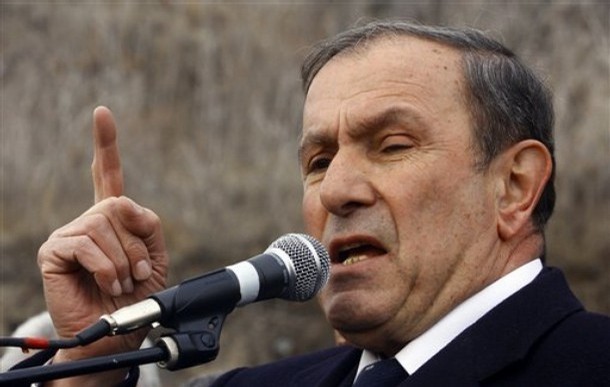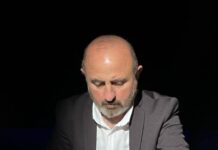
WikiLeaks-Armenia No 64
2007-08-24
C O N F I D E N T I A L SECTION 01 OF 03 YEREVAN 001050
Classified By: CDA R.V. Perina, reasons 1.4 (b,d)
¶1. (C) SUMMARY: CDA’s courtesy call on Levon Ter-Petrossian (LTP) found the former president candid, in high spirits, and eagerly exploring his chances to unify Armenia’s opposition under his own banner for the 2008 presidential election. LTP evaluated his chances as slender, but worth trying, given his assessment that there was no one else who could possibly derail the Serzh Sargsian juggernaut. LTP said he would decide by the end of September whether to declare his candidacy. He noted that his dismal public approval ratings would be a significant challenge, as would the ruling party’s relentless exploitation of financial and administrative resources on Sargsian’s behalf. The ex-president nonetheless thinks he has a shot against the colorless and unloved Sargsian. This would be a tall order. Reliable polls consistently place LTP as the most unpopular public figure in Armenia. END SUMMARY
TANNED, RESTED, AND READY
¶2. (C) CDA and DCM paid an introductory call on former President Levon Ter-Petrossian August 22 accompanied by pol/econ chief. Over the last several years, LTP ha become a near-recluse in his lonely, government-supplied mansion overlooking the Hrazdan River Gorge; so seldom has he been seen in public that some had begun to wonder if the ex-president might be under house arrest. However, recent weeks have brought a modest boomlet in LTP news stories, as several opposition-leaning papers widely covered the ex-president’s series of visits to Armenia’s regions, and ANM-associated commentators have begun calling for LTP to run. LTP has made no substantive public statements, but his new-found interest in seeing how the rural provinces and regional capitals were getting on bear all the hallmarks of an American senator or governor suddenly discovering compelling reasons to visit Iowa and New Hampshire.
¶3. (C) LTP was noticeably livelier and more energized than when the previous CDA called on him last October. The ex-president lost little time in small talk before launching a candid exposition of the political scene and his own place in it. Without having to be asked, he volunteered that he was giving serious consideration to running for president in 2008, and was in active discussions with other opposition leaders to explore that possibility. He said he would make his decision by the end of September. He said that in addition to his own Armenian National Movement (ANM) party, Aram Sargsian’s Republic Party was also prepared to support his bid, as were the leaders of the ANM-derived “Alternative”/”Impeachment” movement. LTP had also spoken with Stepan Demirchian (People’s Party) and Artashes Geghamian (National Unity party), who had responded positively, but “you never know what they might say tomorrow.” LTP said with those two it would all come down to the hard bargaining and what kind of a deal he would be able to strike with them in exchange for their support. “This is normal politics,” he commented. LTP also thinks he has strong support among veterans’ groups, including the Yerkrapah movement. He said there were a number of business oligarchs who were quietly sympathetic to his candidacy, but they would have to be very cautious not to put their business interests at risk by openly supporting LTP too soon.
THE ANYONE-BUT-SERZH CANDIDATE
¶4. (C) The former president said that, despite what he said was the PM’s “absolute” lack of charisma. LTP was aware that any campaign would have to overcome some very significant obstacles. As he himself said, the first problem would be overcoming the “negative stereotypes” about LTP that now prevailed in popular opinion. The former president ascribed his bad public image to a consistent smear campaign that he claimed President Kocharian and his political cronies had conducted over the past ten years, distorting LTP’s political record. He also felt that the Republican machine would employ all means, fair or foul, to favor PM Sargsian and disadvantage LTP. He also speculated that the Kremlin might throw its own support behind Sargsian.
¶5. (C) The ex-president called the current regime “criminal,” lambasting Kocharian, Sargsian, and their cronies for massive abuses of power, corruption, misuse of the tax and customs services for personal and party enrichment, and other sins. LTP noted that his own administration had earned some black marks, but he insisted that his cabinet had been a paragon of virtue by comparison with the current one. He was also sure that authorities would effectively deny the television airwaves to him, seriously complicating his ability to change voters’ minds. LTP felt that despite his negative approval ratings and the obstacles the government would lay across his path, the voters’ distaste for Serzh Sargsian and the entire system that he represents might induce them to support LTP instead. Similarly, wealthy businessmen/oligarchs had a strong incentive to prefer LTP as president. He said they were sick of being continually hit up by authorities for under-the-table payments to fund off-books political or personal projects of Kocharian, Sargsian, and their circle. Meanwhile, owners of property, assets, or businesses were vulnerable at any time to having their property seized by greedy politicians and their families.
HOW TO MOBILIZE THE PEOPLE
¶6. (C) LTP thought there was a chance that the opposition would unite behind him. He acknowledged that Armenia’s opposition forces were chronically fractious and it would be quite difficult to get them all in one big tent. Once accomplished, however, this would give the campaign enough organizational strength to mount public rallies, which combined with radio and newspaper coverage, may be enough to rally popular support. LTP blames his bad public image in part on the simple reality that times were very tough in the 1990s when he was president, and people blamed him for the results of external factors completely outside anyone’s control, such as the collapse of Soviet trading patterns, power blackouts, and shortages.
THE SUBSTANTIVE AGENDA
¶7. (C) LTP outlined a series of reasons that the Kocharian presidency had proven disastrous for Armenia. He said that rampant corruption and the lack of a reliable rule of law was holding Armenia back economically. Investors were deterred from investing in such a climate. There must be public confidence in the integrity of elections and democratic institutions. The continued stalemate and de facto blockade with neighbors Turkey and Azerbaijan is another major economic blow, and resolving these protracted stalemates would be a top priority. LTP called Turkey and Azerbaijan Armenia’s most important natural and traditional trading partners. Iran was a poor substitute by comparison. Meanwhile, Armenia was being systematically left out of regional integration projects, such as oil and gas pipelines and railroads.
WHO ELSE IS THERE?
¶8. (C) CDA asked who LTP thought, other than himself, had any chance of uniting the opposition. LTP thought no one else could pull it off. He pointed out, dismissively, that the others had had ten years to show what they could do, and had gotten no-where. He mentioned Artur Baghdassarian as perhaps the most effective of the lot, only to say Baghdassarian had had his run-ins with rivals and the authorities, and could garner no more than seven or eight percent support at best. None of the others — Vazgen Manukian, Stepan Demirchian, Artashes Geghamian — could do even as well as that. Stepan Demirchian had had his moment in 2003, but his time had passed, Armenian voters had lost condifence in him. LTP said he did not see any other figure who could claim the mantle. The name that never passed LTP’s lips was that of Heritage Party leader Raffi Hovanissian. We didn’t ask.
I’D REALLY RATHER JUST TEND MY GARDEN
¶9. (C) The former president was at pains to emphasize that left to his own personal preferences, he would be much happier to stay home and indulge his gardening hobby, enjoying a well-earned retirement. “I personally need nothing.” He waxed lyrical about the tremendous burdens and responsibilities of the presidency, whose weight he remembered only too well, and which he said he was not eager to take up again. He is compelled, however, for moral reasons, to stand up for his countrymen against the criminal regime that has been holding Armenia back.
SURVEY SAYS…?
¶10. (SBU) USAID has funded an IRI/Gallup series of public opinion surveys, which are the most reliable available source of public opinion data of which post is aware. The July 2007 data show that the former president’s favorable rating is 20 percent, while his unfavorable rating is a whopping 76 percent. It must be noted that the March 2007 figures were 13 percent favorable and 81 percent unfavorable, steady from the November 2006 figures (14 favorable and 82 unfavorable). Thus, there has been a modest uptick in LTP’s favorability figures. Serzh Sargsian’s July ratings were 51 percent favorable and 47 percent unfavorable, virtually unchanged from March, but up slightly from November 2006’s 42 favorable/56 unfavorable scores. When voters were asked the open-end question, “what Armenian politician would you never vote for?” LTP leads the pack with 23 percent (up from 18 percent in March and 19 percent last Novermber). Serzh Sargsian came in second-worst on this question, with 13 percent (vice 10 percent in both March and November) affirming they would never vote for him.
COMMENT
¶11. (C) The fact that the deeply disliked LTP might actually have a reasonable claim as the figure most likely to unite the opposition and stage a credible run against that far-from-beloved Sargsian speaks volumes about the continued lack of credible political alternatives. We judge LTP’s judicious assessment of his own chances as still far too optimistic. His seeming strategy — to mobilize the elites — is the same Soviet-thinking template we hear from all of Armenia’s “traditional opposition” leaders, and has been the recipe for one abject political failure after another. The poll numbers may not tell the whole story. Our read is that the public dislike of LTP is not only widespread, but also runs deep, outside the circle of Yerevan-based opposition intelligentsia who seem quite taken with the idea of an LTP comeback. Sargsian’s figures may also be misleading, however, as his support is shallow. The next voter we meet who has a genuine, affectionate admiration for Sargsian, the long-time gray cardinal of the defense and security services, will be the first. Support for Sargsian is predicated on the assumption that he is the inevitable winner, and is presumed able to deliver spoils and preserve a stable status quo.
¶12. (C) There seems to be only one politician in Armenia who can grasp the importance of reaching out directly to the voters themselves, and that is the American-born and -bred Raffi Hovannisian, who also seems to us the clear public-opinion winner of the May election. Hovanissian, however, is constitutionally ineligible to run for president, barring some unlikely intervention from the president or constitutional court. LTP’s failure to mention Hovanissian may be because the former president assumes Hovanissian will be unable to run for president. More likely, he understands perfectly well who has become his most credible rival for the mantle of opposition leader, and he prefers not to dwell on Hovanissian now seems the biggest “X” factor in the presidential race. If he is able to run, he might have a real shot. Failing that, it is unclear whether he will be willing or able to throw his newfound political weight behind some other opposition candidate.
PERINA













